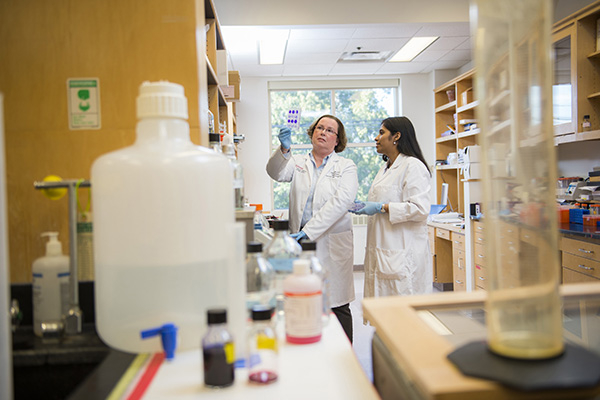Rutgers Receives $4 Million as New Hub to Accelerate Development of Biomedical Technologies
New Rutgers Optimizes Innovation Program to integrate university strengths in biomedical sciences and expertise in research commercialization

Rutgers is among five sites around the country designated as a National Institutes of Health’s Research Evaluation and Commercialization Hub (REACH) to speed up the commercialization of biomedical discoveries into viable diagnostics, devices, and therapeutics, improve patient care, enhance health and train the next generation of innovators.
The new Rutgers Optimizes Innovation (ROI) Program, supported by $4 million over four years, will integrate the university’s strengths in the biomedical/bioengineering sciences and the solid expertise of its Research Commercialization team within the Office of Research and Economic Development to swiftly uncover, develop and seamlessly guide innovators through the commercialization process with financial and regulatory, IP protection, mentoring, management, and educational resources.
“This award creates a platform to springboard discoveries made at Rutgers to initiate new products to improve health and cure disease. This is in alignment with Governor Phil Murphy’s mission to be a state that promotes innovation,” says Reynold A. Panettieri, vice chancellor for translational medicine and science and director of Rutgers Institute for Translational Medicine and Science (RITMS).
The ROI Program brings together Rutgers-New Brunswick’s schools of engineering and arts and sciences, and the university’s medical schools, nursing programs, dental program, public health, and research institutes and centers with industries, incubators, funders and policymakers.
“Rutgers University has strong and robust science and clinical components. As such, it is imperative to provide a comprehensive, yet rapid, pathway to further advance biomedical innovations that contribute to the betterment of public health,” notes Rutgers Cancer Institute director Steven K. Libutti, who is also vice chancellor of cancer programs, Rutgers Biomedical and Health Sciences, and principal investigator on the grant.
The Cancer Institute of New Jersey, RITMS, and the New Jersey Center for Biomaterials (NJCBM) will work together to identify innovative health-related technologies for possible commercialization, especially precision medicine therapy.
"Rutgers researchers are working on potentially transformative technologies. We look forward to steering these important advances through the next stages of development and commercialization," adds principal investigator Renata Pasqualini, who is chief of the Division of Cancer Biology in the Department of Radiation Oncology at Rutgers Cancer Institute and a professor of medicine at New Jersey Medical School.
Joachim Kohn, principal investigator on the grant, points out that the government's support for translational activities is not only innovative but also critically needed. “Accelerating the translation of a host of Rutgers health care technologies with this support can considerably impact the nation’s health care system,” says Kohn, who is also the director of the New Jersey Center for Biomaterials and scientific founder of several Rutgers spin-off companies. “Additionally, by enabling advances in precision training and diverse workforce enhancement, including training on prototyping facilities and scaling techniques to expand production capabilities, the REACH program also benefits the U.S. economy.”
Through educational programs embedded in the ROI Program, innovators at the university will have access to hands-on training in product development and experts, including previous inventors at Rutgers, who have commercialized products, understand how to build a business model, and can help faculty researchers take their discoveries to the next level.
“We’ve seen a gap in funding and resources necessary for researchers to advance early-stage inventions from the lab to the marketplace. We also recognize the need for training and business expertise to help our faculty transform their inventions into marketable products and successful startups,” says S. David Kimball, senior vice president for research and economic development at Rutgers. “Our Research Commercialization team stands ready to provide the environment, knowledge and tools for our researchers to commercialize their inventions and to keep improving human health across the world through the Rutgers Optimizes Innovation program.”
Leaders from the Office of Research and Economic Development, Rutgers–New Brunswick and Rutgers Biomedical and Health Sciences have committed a combined $760,000 in annual matching funds for the next four years to support the goals of the ROI program and enhance its sustainability efforts.
“Whether cancer clinical trials, data infrastructure, new technologies or other, enabling investigators to further propel their research in the development pipeline is key. The REACH Hub will provide integrated, streamlined services for Rutgers researchers and their collaborators so that the discoveries of today can quickly become tomorrow’s solutions,” adds Libutti, who is also senior vice president, oncology services, RWJBarnabas Health.
Each hub through the REACH program scouts for biomedical projects, which are reviewed by product development experts to determine if they are promising and should be funded.
The new REACH awardees join a national network of proof-of-concept centers that includes three REACH hubs funded in 2015 and three NIH Centers for Accelerated Innovations (NCAI) that were launched in 2013. In less than five years, the NCAI and REACH have supported 269 research and development projects, provided entrepreneurial training for more than 2,200 scientists, and facilitated formation of 59 spin-out small businesses to solve some of society’s most pressing health care needs.
The Rutgers Optimizes Innovation (ROI) Program is being supported by the National Heart, Lung, And Blood Institute of the National Institutes of Health under Award Number U01HL150852.